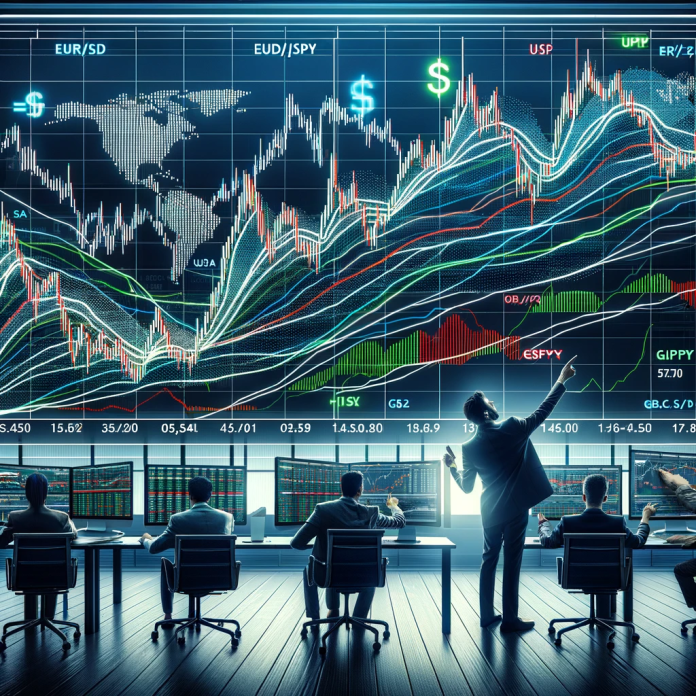Introduction
Forex trading, also known as foreign exchange trading, is the global marketplace for exchanging national currencies. It is one of the largest financial markets in the world, with a daily trading volume exceeding $6 trillion. This guide will introduce you to the fundamentals of forex trading, how the market operates, the key participants, and the importance of currency exchange.
Understanding The Forex Market
The forex market is a decentralized market where the world’s currencies are traded. It operates 24 hours a day, five days a week, providing ample opportunities for traders. The primary purpose of the forex market is to facilitate international trade and investment by enabling currency conversion. This is crucial for businesses that operate across different countries and require exchanging currencies for transactions.
How Forex Trading Works
Forex trading involves the simultaneous buying of one currency and selling of another. These currency pairs are traded in lots, which represent a standardized quantity of the base currency. The most commonly traded pairs include EUR/USD, USD/JPY, GBP/USD, and USD/CHF.
Prices in the forex market are quoted in pairs, for example, EUR/USD 1.2000. This quote indicates that one euro is worth 1.2000 US dollars. The first currency in the pair is the base currency, and the second is the quote currency.
Traders make a profit by speculating on the future movement of currency pairs. For example, if a trader believes the euro will strengthen against the US dollar, they would buy EUR/USD. If the market moves in their favor, they can sell the pair at a higher price, thus making a profit.
Key Participants In The Forex Market
Several key participants play a vital role in the forex market:
Commercial Banks: Major banks conduct a large volume of foreign exchange transactions on behalf of their clients and for their proprietary trading.
Central Banks: National central banks, such as the Federal Reserve or the European Central Bank, manage currency reserves and influence the forex market through monetary policy and interventions.
Financial Institutions: Investment funds, hedge funds, and brokerage firms participate in forex trading to diversify their portfolios and manage risk.
Corporations: Multinational corporations engage in forex trading to hedge against currency risk and facilitate international trade.
Individual Traders: Retail traders participate in the forex market through online trading platforms. They seek to profit from currency fluctuations by trading on margin.
The Importance Of Currency Exchange
Currency exchange is essential for various reasons:
Facilitating International Trade: Companies engaged in import and export activities need to convert currencies to conduct business.
Investing in Foreign Markets: Investors require currency exchange to invest in foreign stocks, bonds, or real estate.
Travel and Tourism: Individuals traveling abroad need to exchange their home currency for the local currency of their destination.
Economic Stability: Currency exchange helps maintain economic stability by allowing central banks to implement monetary policies and control inflation.
Key Concepts In Forex Trading
To become a successful forex trader, understanding the following key concepts is crucial:
Leverage: Leverage allows traders to control a large position with a relatively small amount of capital. While it can amplify profits, it also increases the risk of significant losses.
Pips: A pip is the smallest price move in a currency pair. It stands for “percentage in point” and represents the fourth decimal place in most currency pairs.
Spread: The spread is the difference between the bid and ask price of a currency pair. It represents the cost of trading and can vary depending on market conditions and liquidity.
Margin: Margin is the collateral required by a broker to open and maintain a leveraged trading position. It ensures that traders have enough funds to cover potential losses.
Technical Analysis: This involves analyzing historical price charts and using indicators to predict future market movements.
Fundamental Analysis: This approach involves evaluating economic indicators, geopolitical events, and central bank policies to forecast currency movements.
Getting Started With Forex Trading
If you’re interested in forex trading, follow these steps to get started:
Education: Invest time in learning about forex trading, market analysis, and risk management.
Choose a Broker: Select a reputable forex broker that offers competitive spreads, a robust trading platform, and reliable customer support.
Open a Demo Account: Practice trading with a demo account to familiarize yourself with the trading platform and develop your strategies without risking real money.
Develop a Trading Plan: Create a trading plan that outlines your goals, risk tolerance, and trading strategy.
Start Trading: Once you’re confident, start trading with a live account, but always trade responsibly and manage your risk carefully.
Conclusion
Forex trading offers numerous opportunities, but it’s important to approach it with a solid understanding and a disciplined strategy. By learning the basics and continually improving your skills, you can navigate the forex market and work towards achieving your trading goals.
